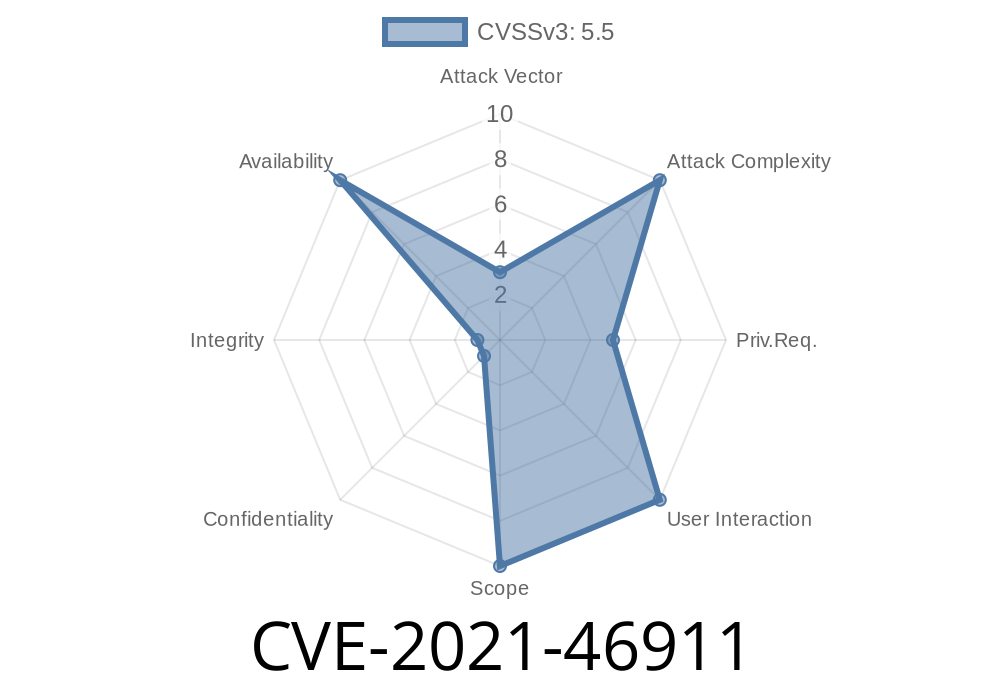The Linux kernel is at the heart of countless servers, smartphones, routers, and supercomputers. It’s battle-tested, secure, but sometimes, even this codebase slips up. CVE-2021-46911 is one example—a bug born from a small mistake in memory handling within the ch_ktls driver that could bring your system crashing down. In this exclusive post, we’ll break down this vulnerability, explain how it happens (with code snippets!), and show exactly how it was fixed.
What is ch_ktls, and Why Does It Matter?
ch_ktls is a Chelsio offload driver for Kernel TLS (Transport Layer Security). TLS runs mostly in user space, but with kernel TLS (ktls), encryption/decryption can be offloaded to hardware, improving performance for servers that need to handle lots of encrypted traffic.
If you’re not using Chelsio hardware or kernel TLS, this may not directly affect you. But if you’re running high-performance Linux servers (such as load balancers or proxies), this driver might be crucial.
What Is CVE-2021-46911?
This bug was found in the way the driver managed memory for TLS packets. Developers tried to “hold a reference” on a page (a memory block) during transmission but, due to the complex dance of network acknowledgments (ACKs) and memory cleanup, this led to situations where the system tried to access memory that was already freed—a classic use-after-free, which in a kernel usually means… kernel panic. System down. All because of a tiny miscalculation in managing refcounts (the “number of references” to a memory page).
The "Refcount" Mistake
A “refcount” is like tally marks for memory: each time something uses a block, the mark goes up, and when it’s done, it goes down. If you forget to add a mark before using a block, or take one away too soon, Linux might throw it away, even though someone still needs it.
Here’s a simplified view of what the driver was doing
// Pseudo-code (simplified)
get_page(sk_buff->page); // Increase reference count
transmit_packet(skb);
...
// Meanwhile in a different context:
if (ack_received) {
// ACK said it's done!
put_page(sk_buff->page); // Decrease reference count
}
If an ACK was received *while* the driver was still transmitting (before it finished), the page would get cleaned up too soon. If something then tried to access it… crash!
Why Does This Happen?
In real-world, high-speed networking, ACKs can come in while you’re still handling data. If your locks (protections saying “hey, I’m busy with this memory!”) are too loose, Linux releases the memory, thinking it’s not in use, even when the hardware might still need it.
The Kernel Panic: Real Impact
Imagine a high-traffic HTTPS server using kernel TLS with Chelsio hardware. Under load, a well-timed ACK from a client hits just as the driver is in the middle of processing a packet. If that page gets freed, the kernel could try to read or write nowhere—causing a panic. You lose everything that’s running: databases, web servers, applications.
The Fix: Smarter Locking, No More Premature Cleanup
The patch for this didn’t add more refcounts—it changed *how* the driver handled its “locks”.
Patch Snippet: The Proper Way
The maintainers replaced page reference counting with a mutex (a strong lock) for the entire transmit operation:
mutex_lock(&tx_ctx->lock);
transmit_packet(skb);
mutex_unlock(&tx_ctx->lock);
With this, the code simply *refuses* let anything else clean up the memory until it’s done with it. Once transmission is complete—including any interactions triggered by ACKs—the lock is released, *then* memory cleanup can safely proceed.
Exploit Details
This bug isn't trivially exploitable to escalate privileges, but it's dangerous: attackers could trigger frequent kernel panics (DoS—Denial of Service) by flooding the server with well-timed ACKs while sending and receiving TLS traffic over Chelsio cards. Reproducing it reliably would need control over the network and exact timing, but a persistent adversary could crash your server.
Linux Kernel Patch:
CVE Page:
Chelsio KTLS Driver Overview:
How to Protect Yourself
1. Upgrade Your Kernel. Any distro kernel from late 2021 or newer should be safe, but check your version!
2. Watch for Unusual Panics. If you use Chelsio hardware and kernel TLS, monitor for unexplained system crashes.
3. Limit Public TLS Offload Use. Don’t expose these interfaces directly to untrusted networks if you can avoid it.
Conclusion
CVE-2021-46911 is a great example of how a single mismanaged refcount can threaten the world's most robust operating systems. Thanks to the open nature of Linux and diligent maintainers, the bug was found and patched. Still, it’s a useful lesson—never take memory management or locking for granted… especially in high-speed, concurrent systems.
Stay up to date. Stay safe. Patch your kernels!
Have questions, or want more Linux kernel deep-dives? Leave a comment below!
Timeline
Published on: 02/27/2024 07:15:07 UTC
Last modified on: 04/10/2024 13:49:55 UTC
